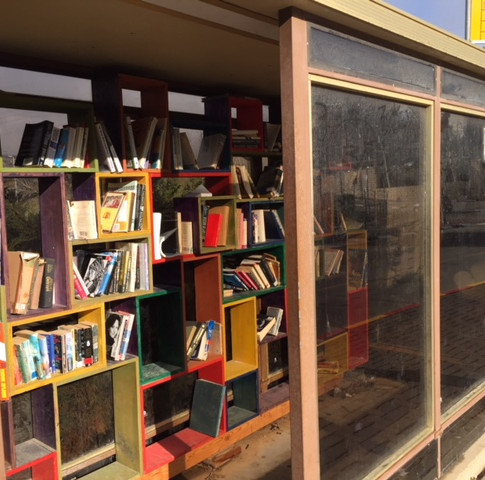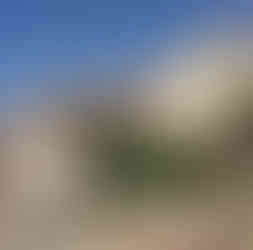Efrat: Life in Israeli Suburbia
- Feb 14, 2018
- 4 min read
It took me about two weeks to settle into a routine. I shopped and organized my apartment, started to acquaint myself with Efrat, and became familiar with the Yeshivah and the approach of my teacher, Rav Boaz. I was then (two weeks ago) ready, weather permitting, to walk to classes and to, little by little, get to know Efrat. One of the delightful surprises came on the first morning’s walk. Passing a bus stop, something caught my eye (ouch!) and I peeked in and saw, inside the bus shelter, shelves with books--a modest library. I got a kick out of it.
The 25-minute walk to the Yeshivah includes several steep hills. No complaints. Every day it is my opportunity to walk Israel, maybe not quite as Abraham did, but with a deep sense that this land, where my feet tread, is ours.
Efrat is a relatively dense, suburban town, with, according to Micah, about 10,000 residents. It is growing (picture from Micah’s balcony of new construction).

In some ways Efrat resembles U City (and is unlike Creve Coeur) -- houses are close together (even closer than U City; with a few small lawns and gardens), with schools, grass and urban parks, and small shops all within a few minutes walking distance, right off the man road (King David). One difference is that Efrat’s houses are made of stone (photos below). The other major difference is that about 90-95% of Efrat residents are modern religious Jews; about half, I am told, are Anglo.
Efrat grew from the south (the Yeshivah is at its southern end) back north towards Yerushalayim. (My apartment is in about the middle of Efrat.) As I head back to my apartment I decide to explore a small shopping area, still yet about 15 minutes walk from my apartment. There are several eateries -- Burger’s Bar, New Dehli (like Subway), a pizzeria, and one selling prepared foods -- Israeli salads and schnitzel, etc -- with outdoor and indoor eating areas. Among the stores are a small Judaica shop, eyeglass store, beauty salon, travel agent, candy store, and butcher, all anchored by a decent-sized supermarket.
(This area is in addition to a smaller center, only a 5-minute walk from my apartment, which is also anchored by a modest-sized supermarket, a pizza place, a shwarma place, a crafts store, a household/toys/games store, and a men’s barber shop, among a few others.)
Still on my way back, I check out a building that is part of an entire complex. It has a library on the main floor and a fitness center -- just weight machines -- on the ground floor below. The complex includes two schools (national-religious), a youth center, a medical center with urgent care (which I later learned was built only about two years ago), a municipal center for the local government, and a building with a basketball court, with upper level seating for spectators, which is used as a social room. Since there was a municipal building I asked if there is a jail. No. Crime is not much of an issue here.
As I turn up my street, passing a playground and a makolet (an Israeli convenience store), I pass one of the day care centers (ages 2-5, I think), and see women with baby carriages and children just outside. A delight. The present and the future! (see photos). I routinely see hitchhikers (called “tremps”), joggers, and cyclists. Because Efrat is enclosed with great views and hills, it is great for children and adults on bicycles. From the edge I can see Bethlehem; Israelis are forbidden to enter.
Last week I decided to check out two of the newer sections of Efrat -- the most northward -- Dagan and Tamar. Whereas the other sections are connected and are walkable, Dagan and Tamar are further out and are built on high hills. They are currently sparsely populated, but construction there is booming, and several signs advertise opportunities for purchase.
I close with a simple personal story. Israelis start their work week on Sunday. Because Shabbat ends the week, it is likely the only country in the world that does so. It creates a very different rhythm with Shabbat and for international business.
I remember the adjustments to Sunday as a work day I made in my first years in Israel (1980-'81 and '81-'82). When I first came here, it felt like a lost day -- I wondered where that lazy, comfortable, off-day of sports and shopping and household care had gone. And, consequently, what happened to very late Saturday nights? But when I returned to the US, I had to re-adjust again: There seemed to be this extra, unnecessary day.
Of course, here the entire week has a different flow. Many Israelis, perhaps most, religious and non-religious, take off on Friday, or at least a part of it. Therefore, at the local shul, Friday shacharit services begin at 8:30 instead of 7:00, paralleling Sunday at Traditional.
On my first Friday, they did not do a particular prayer and I was curious; when we came to the psalm of the day, I instinctively began with the psalm for Sunday, and was, for a second, stunned when I heard someone begin to recite the psalm for Friday -- until I realized my mistaken mindset.
The rhythm of the week waning with Friday to prepare for the week ending with Shabbat, rather than with Sunday, is another reminder of the joy of living in a thick national Jewish culture, with so many members of the mishpachah.


















































